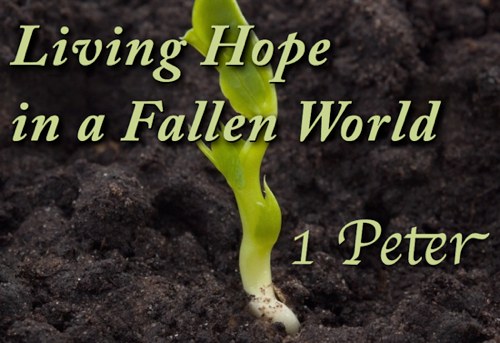
Bible Study Questions
1 Peter 1:3-12
The Rich Hope of Salvation
Paul J. Bucknell
_________________________
1 Peter Bible Study Questions: 1:1-2 || 1:3-12
Christian believers learn how their faith in Christ helps them embrace God’s abounding grace to gain their eternal award, no matter what they might face. Peter identifies four hopes that verifies the extraordinary value of our faith in Christ.
(1) A Sure Hope (1:3)
God’s miraculous work in a believer begins one’s spiritual birth and new life enabled through the resurrection of Jesus Christ.
“Blessed be the God and Father of our Lord Jesus Christ, who according to His great mercy has caused us to be born again to a living hope through the resurrection of Jesus Christ from the dead” (1 Peter 1:3, NASB).
-
How would you state the words, “Blessed be...” in your own words?
-
What are at least two reasons to bless God given in verse 3?
-
What does it meant to ‘be born again?” Read John 3:1-8 for further understanding.
-
What does the resurrection of Jesus Christ have to do with their living hope?
-
Do you think that you deserve salvation at all? How does your answer match with the concept that it is by the mercies of God (1:3) that one is saved?
(2) An Eternal Hope (1:4)
God’s purposes each new life to spring up and keep blossoming into eternity.
“To obtain an inheritance which is imperishable and undefiled and will not fade away, reserved in heaven for you” (1 Peter 1:4, NASB).
-
What is an inheritance? What inheritance will they gain (Eph 1:11,14,18; Col 1:12; Heb 9:15; 11:8)? When?
-
What are the three descriptions of this inheritance found in verse 4? How are they different from each other?
- What part of verse 4 do you like most and why?
|
All BFF's New Testament Biblical material in one spot! pdfs, handouts, commentary, maps, powerpoints, audios, videos, and much more! |
(3) An Enduring Hope (1:5-7)
God gives us a hope that continues through bad times. Though Satan tempts us, the world lures us and our flesh battles us, God's power is stronger. We might not feel like holding on, but we do and we must.
“Who are protected by the power of God through faith for a salvation ready to be revealed in the last time. 6 In this you greatly rejoice, even though now for a little while, if necessary, you have been distressed by various trials, 7 that the proof of your faith, being more precious than gold which is perishable, even though tested by fire, may be found to result in praise and glory and honor at the revelation of Jesus Christ” (1 Peter 1:5-7, NASB).
-
There were a number of things mentioned here that threaten their faith. List the ones found here and complement this list with other possible threats to their faith.
-
It is good that the power of God protects us! But how? Take one or two of the items from the former list and state how God’s power makes a difference in those situations.
-
Describe the imagery used by “tested by fire” (1:7).
-
What does “at the revelation of Jesus Christ” refer to (1:7)? Also compare Acts 1:9-11 and 1 Peter 1:13, 4:13).
-
Do you ever get scared about losing your faith or wonder if it is strong enough to withstand the trials that might come? Explain.
(4) A Genuine Hope (1:8-12)
God’s protection of our eternal salvation is found in our faith, that though tested, will endure and bring grand praise upon Christ’s return.
“9 And though you have not seen Him, you love Him, and though you do not see Him now, but believe in Him, you greatly rejoice with joy inexpressible and full of glory, 9 obtaining as the outcome of your faith the salvation of your souls.”
“10 As to this salvation, the prophets who prophesied of the grace that would come to you made careful search and inquiry, 11 seeking to know what person or time the Spirit of Christ within them was indicating as He predicted the sufferings of Christ and the glories to follow. 12 It was revealed to them that they were not serving themselves, but you, in these things which now have been announced to you through those who preached the gospel to you by the Holy Spirit sent from heaven--things into which angels long to look” (1 Peter 1:8-12, NASB).
-
How do they express their faith (1:8)? Who does “him” refer to in this verse? What makes you think so?
-
Verse 9 states that our enduring faith results in the salvation of our souls. What is a soul and what does it mean by “salvation of your souls”?
-
What did the prophets of old seek to know? What did they discover (1:10-12)?
-
How do the Old Testament prophets help us more than the prophets themselves?
-
Why do you think the angels long to look into these things (1:12)?
-
How true is it of you that you “love Him” and “believe in Him” (v.9) though you do not see Him?
Advanced Questions
-
Peter states ‘resurrected from the dead’ in verse 1:3. Incipient forms of Gnosticism were found during this time. They would generally deny that Christ had a body and therefore He could not die. They believed the body was evil (much like Hinduism and Buddhism and forms of Eastern mysticism).
How would the emphasis ‘from the dead’ combat this distorted view of the human body? What is the correct view? -
Compare Paul’s (Ephesians 1:3) and Peter’s (1 Peter 1:3) “Blessed....” sections of scriptures.
-
Verse 4 speaks about our eternal inheritance. Do you meditate much on this? Set aside at least ten minutes and think up ten great things about this eternal inheritance.
-
Peter speaks about how the power of God protects our faith. In light of this passage, how do you explain those that lose their faith or just don’t care anymore for their faith?
-
When Peter was writing, the New Testament was not fully formed. Different books like this were written to various areas. The Old Testament was fully formed, however, and had a great impact on believers as it does today. What are some things we learn about the prophets and the Old Testament scriptures from 1:10-12?
Try to answer questions like, “Who wrote them?” “Why did they write them?” “What did the authors know about their purpose?” “Did they believe there was something greater coming?” “What did they know about that greater One or thing?” “How should we in the gospel era be helped by these sacred books?” -
From these verses, what would you say the best way to protect and strengthen your faith? How will you make sure those things are practiced in your life? Be practical and follow up on yourself.
info@foundationsforfreedom.net
Scriptures typically quoted from the New American Standard Bible unless noted:
(C) Copyright The Lockman Foundation 1988











